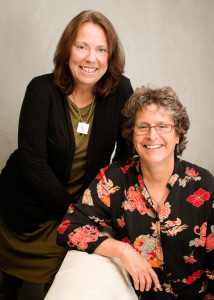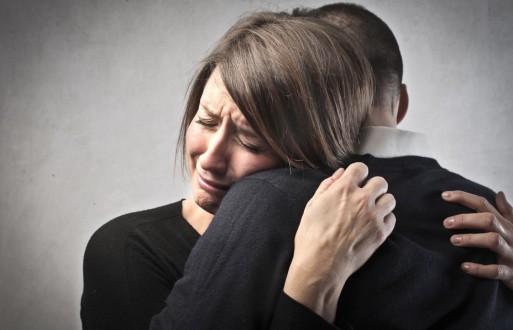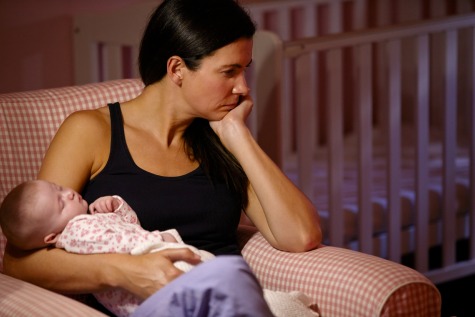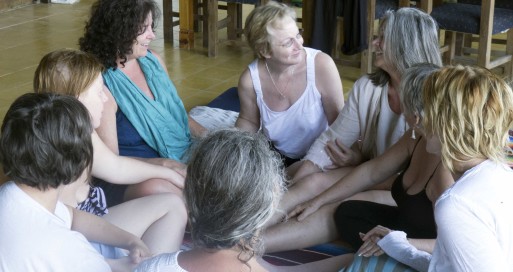Today is part two of SevenPonds’ interview with Gaby Donnell, Licensed Clinical Social Worker and co-founder of Motheroots Counseling, based in Portland, Oregon. (Read part one here.) Motheroots provides counseling services to adults in their childbearing years, helping them deal with issues around fertility, loss of pregnancy, death of a child, postpartum depression, maintaining healthy adult relationships and parenting approaches.

Motheroots counselors Gaby Donnell (right) and Laurie Cox (left)
(Credit: photos.campbellsalgado.com)
Juniper: Could you share with our readers a short mindfulness practice you would use with a client?
Gaby: For some people, just sitting still and taking a few breaths is all they can tolerate or all they need to ground themselves. For others, it’s having a regular daily practice of walking or writing, for example, to give them a container in which they can experience their truth in a private and less overwhelming way.
Some people come into my office and just need to slow down, so I invite them to feel into their body as they sit — to feel their hands on their lap; to feel their feet going into the earth; and ultimately to put a hand over their heart and feel compassion for their own experience. This is a powerful yet generic practice that may look slightly different depending on who is in front of me. There’s compelling research out now showing that self-compassion, especially in times of suffering, is very wholesome and nurturing for our brains and general well being.

Credit: steadyhealth.com
Juniper: You also help individuals and couples relate to themselves and each other in the postpartum phase. What are some issues that come up after the birth of a child, particularly for those parents who have experienced pregnancy or infant loss in the past?
Gaby: There’s a lot of literature about how infertility or loss can be problematic for a romantic partnership because it’s such a high-stress situation. In my experience, those are the times I’ll usually see people as a couple. We focus on how people grieve and navigate infertility, and practice being patient with one another — finding a place in the middle.
I see a skewed population because the people I see are those who have chosen to come to counseling. But, of the people I have worked with, I’ve seen an incredible amount of care and love that comes out of situations like infertility or a child dying. A relationship can deepen through communication, rituals that are mutually meaningful and binding and finding ways to support each other. I don’t look at grief pathologically, but rather as an opportunity to really be there for each other, even though you may be needing different things.
Take a recent example from my practice: A couple had a child die, and the father wanted to sue — he was really angry. The woman was more focused on getting pregnant again as soon as possible. This is a situation in which there could be big conflict in their marriage. Being able to hear each other’s perspective helped them to see that they were both coming from an experience of grief, and that allowed them to not be angry with each other.

Mother suffering from postpartum depression
(Credit: patheos.com)
Juniper: Can you speak to the complex situations and emotions that come up around abortion/intentional termination of pregnancy?
Gaby: It’s interesting you mention that, because Holly Pruett — who started the Death:OK conference — and I are about to get together to talk about that. There is a political issue here that is so divisive that people have a hard time navigating their own experience in terminating a pregnancy, whether that be for medical or any other reason, in a way that feels supportive.
I’m going to divide the issue into a “left wing” and “right wing” approach. The “left wing” says you should do whatever you want and go for it! There’s also a subtle message that it’s your right, so don’t feel bad about it. Then there’s the other side, which says abortion is wrong, and anyone who chooses to engage in any way is a murderer.
There’s a lot of polarization around this topic, and what gets caught in the middle is the rest of us, who may have made choices in our lives about which we have very complex feelings. There will be times in our lives where the memory of past choices will manifest with regret, or wondering or relief, and all of that is true and normal and right. There aren’t many forums in which women and their families can talk about that, so people are still silent with their experience of abortion.

Credit: eventbright.com
It’s tremendously difficult to find for a client an environment in which they can show up how they are, in all their complexity, without the politicization that says either, “Get over it; you did the right thing,” or “You’ve really messed up and now you need to hold signs with us.” I think it’s really tragic, and a huge cost on the well being of many people. It’s hard to stay silent about something so meaningful and so tender.
Juniper: Do you have any comments regarding the services and objectives of Motheroots that we have not yet covered?
Gaby: I want to go back to the infertility aspect, which is another silent suffering that many people endure. After loss or during a period of infertility, there is a tendency to compare oneself to others of the same age group, with growing families, and think, “Why is that not me?” There tends to be ambivalence about parenting, and a lot of value-laden judgement and isolation that doesn’t allow us to be our best selves. It’s tremendously difficult, and the more we can all speak to each other about our actual experiences — when someone is courageous enough to say in a yoga class or woman’s group that they had a stillbirth or struggles with infertility — people come out of the woodwork and with similar stories, and there is less isolation when that happens.
Both Laurie and I are committed to breaking down those barriers that say “This is how the world is, and if I don’t fit in because of my choices or physical capacity, then I’m wrong and need to change.” I don’t think that perspective serves us as human beings.
Juniper: Thank you, Gaby, for this insightful conversation, and the important work you do!
Gaby: Thank you!

 Can Counseling Help Heal Childhood Trauma, Grief and Loss? An Interview with Gaby Donnell, Part Two
Can Counseling Help Heal Childhood Trauma, Grief and Loss? An Interview with Gaby Donnell, Part Two


 Funeral Home Owner Chris Johnson Spending Halloween in Jail
Funeral Home Owner Chris Johnson Spending Halloween in Jail
 Our Monthly Tip: Toast a Loved One with a Personalized Glass
Our Monthly Tip: Toast a Loved One with a Personalized Glass
 My Cousin’s Death Taught Me the Meaning of Life
My Cousin’s Death Taught Me the Meaning of Life














